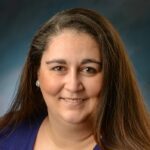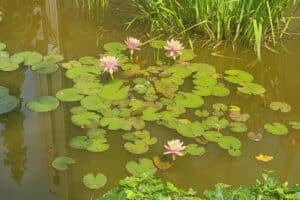Volume 37 Number 4 | August 2023
K. Lindsey Davenport-Landry, DCLS, MLS(ASCP)CM, ASCLS Board of Directors


Author Lindsey Davenport-Landry went on a field trip with her son’s second grade class to a botanical garden where she shared her knowledge of science with the kids.
Recently I went on a field trip with my twin son’s second grade class to a botanical garden. I did not go into it as an outing where I would discuss laboratory science; I went to be a supportive parent and get to see cool plants. However, as botany, a sister science, was discussed, questions about genetics of plants was a topic—a second-grade-level discussion, of course, explaining how there are many types of banana trees, but we only really eat one type. A kiddo standing near me asked, “How do we get a tree to make bigger bananas?” I looked at this group of second graders who were standing at the back of the group having their own discussions and said, “They pick plants based on the traits they want to see, like bigger bananas, take seeds or pollinate it, and try to grow a tree with big bananas again.”
Now, if these kiddos were bigger, we could have talked about Mendelian inheritance and using two traits to get what you want, but for second graders we talked about selective methods. One kiddo related it back to himself and said, “That is why I am tall like my dad.” Exactly, kiddo.
When we walked through the greenhouse there were some very cool plants. One of them was the Venus flytrap, which traps a fly and secretes digestive fluids that dissolve its prey. My son asked why this plant eats bugs. We read the placard which stated that it grows in soil that is nutrient poor and therefore must get nutrients from the flies.
“I can share my knowledge with these children, building up to discussing clinical laboratory science with their classes so they know there is a career in the laboratory if they enjoy chemistry, biology, and physics.”
I did not bring up anything about clinical laboratory science, but I did share a nugget of information, and I learned new things about plants through a guided learning experience and reading the facts provided at the exhibits. So why am I sharing this? We continue to face a shortage of laboratory scientists. We do a reasonably good job of providing guidance to adults about laboratory testing—we speak to the media about laboratory topics and share information on social media to debunk myths about COVID testing. But what we (I) need to do better is build community outreach to younger kids before they have decided what they want to be when they grow up. Giving them tools and getting them interested in science early will ideally influence the decisions they make when they are in high school and entering college, to choose science.
Will volunteering on one field trip make the difference we need? No, but it is a start. I can share my knowledge with these children, building up to discussing clinical laboratory science with their classes so they know there is a career in the laboratory if they enjoy chemistry, biology, and physics. If each person who reads this article takes some time to share with our community, then we will make a difference. There are many STEM events, but the effort does not have to be formal. I challenge each of you to do something in the next year that is a community outreach where you promote science and learning. I will continue to share what I do as a laboratory scientist with all who listen, but moving forward I will try to share with the larger community that includes children.
K. Lindsey Davenport-Landry is Chief Medical Technologist at Iowa City Veterans Affairs Health Care System in Iowa City, Iowa.
For resources to help promote medical laboratory science as a career, see the ASCLS Career Recruitment Tool Kit.